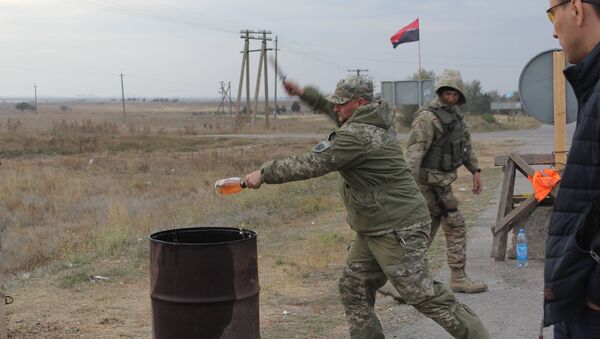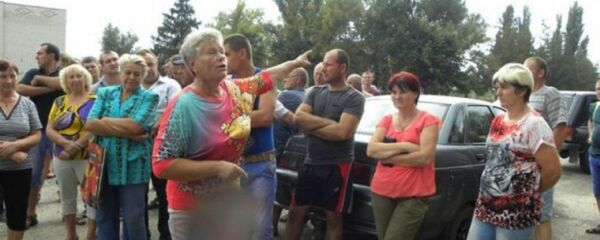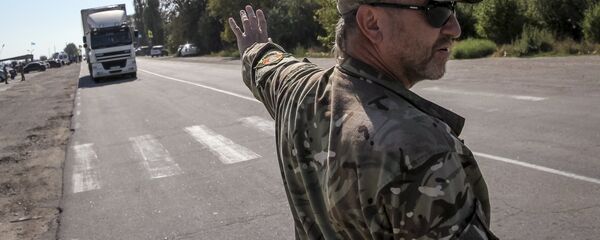On Monday, in an incident widely reported on and celebrated by Ukrainian media, Right Sector militants took away a few expensive bottles of alcohol from a Russian couple making their way back to Crimea through Ukraine.
Coming home from a musical festival in Europe, the couple was stopped and searched at a checkpoint in Kherson, their samples of fine European wine, beer and other alcohol confiscated, and smashed over a barrel by the Right Sector.
Блокада Крыма: Правый сектор отобрал у россиян и уничтожил дорогой алкоголь http://t.co/7SH9AMgl2W pic.twitter.com/43FX30xWex
— Новости Украины (@24todaynetua) 12 октября 2015
"Crimea Blockade: Right Sector Took Away and Destroyed Expensive Alcohol From Russians"
The incident seems to serve as an indication that the blockade's activists have switched from a strategy of stopping only commercial vehicles laden with food from entering the peninsula, to one where they stop and search individuals at will for whatever they choose to define as contraband as well.
The change in strategy may be meant to serve as a demonstration of the activists' resolve in choking off the peninsula, in the face of growing complaints by the blockade's organizers about its inability to become anything more than a minor nuisance for Crimeans.
Last week, Poroshenko Bloc MP Mustafa Dzhemilov, one of the blockade's organizers, complained to the president that Ukrainian food is still making it to Crimea via barges leaving from Kherson.
Incensed over the politician's comments, the Ukrainian border service responded by declaring that Crimea was completely cut off from the Ukrainian side, adding that it had no information about any barges laden with food heading to the peninsula.
But as an investigation conducted by Ukrainian news portal Vesti last month confirmed, Ukrainian producers have created all manner of clandestine routes in an effort to make it to the peninsula. Some have even gone so far as to drive their goods north through the region of Kharkiv, passing into Russia, heading south and having the goods loaded onto barges and shipped to Crimea through the Sea of Azov.
Electricity Blockade
On Monday, Ukrainian media reported that activists' had begun to make good on their promises to begin an 'electricity blockade' of Crimea, noting that protesters had damaged a power line between Melitopol and Dzhankoy, promising to close the three remaining lines in the near future.
Энергетическая блокада Крыма началась: http://t.co/dU1vavpvaE pic.twitter.com/gQRIoWv0ke
— Сегодня.ua (@segodnya_online) 12 октября 2015
"The energy blockade of Crimea has begun."
According to blockade coordinators, their initiative is aimed at pressuring the authorities into passing a law to completely stop the provision of electricity to the peninsula.
In an apparent sign of discord between the activists and the Ukrainian government, Energy Minister Volodymyr Demchishin declared Monday that the Ukrainian government will continue to fulfill its obligations to supply the peninsula with electricity, and that repair work on the damaged line is under way.
According to Ukrainian energy analyst Dmitri Marunich, the power heading to Crimea via the remaining lines is sufficient for the moment, "but it is difficult to say what will happen next, given that temperatures are continuing to fall, and this naturally leads to an increase in consumption."
Presently lacking about 880MW in power, Crimea is 70% dependent on electricity delivered from Ukraine. A 300-400MW energy bridge from Russian Krasnodar is set to come online as early as later this month, with design and surveying work for the construction of two large thermal power stations in Simferopol and Sevastopol also underway.
"If [the energy bridge] is loaded to full capacity, it will significantly reduce dependence on Ukraine from 70% to 45-50%," Marunich said, speaking to Ukraine's NewsOne television. "Meanwhile, Crimean authorities are planning on putting its second phase into operation before 2017, and to build two thermal power plants that will run on their own resources. We, meanwhile, will lose a market."
Meanwhile, Crimean authorities have already made preparations for an electricity cut off from the Ukrainian side, with hospitals, other essential services and utility companies equipped with backup generators.




